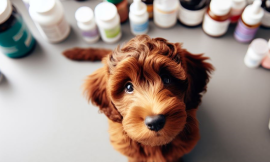A: The First Mate – Puppy’s First Shots
Ahoy, puppy parents, and welcome to the exciting chapter of your furry friend’s health journey! In this third part of the series, we’re casting off to explore the significance of your puppy’s first vaccinations, which set the course for a lifetime of well-being. Think of these first shots as the ship’s first mate, taking on crucial responsibilities right from the start.
The Importance of Puppy’s First Shots:
Much like the ship’s first mate plays a vital role in ensuring a smooth voyage, your puppy’s initial vaccinations are instrumental in safeguarding their health. Here’s why these first shots are of utmost importance:
1. Protection from the Start:
- Puppies are like young adventurers setting foot into an unknown world. They are born with limited immunity and rely on their first vaccinations to begin building defenses against diseases.
2. Early Lessons in Immunity:
- Puppy vaccinations introduce the immune system to some of the most dangerous adversaries, like distemper and parvovirus. It’s akin to a novice sailor learning the ropes of the trade, but for your puppy’s immune system.
3. Setting the Course:
- These first shots provide the groundwork for your puppy’s future vaccination schedule. They establish the route your veterinarian will navigate to keep your pup’s immunity on track.
When to Expect Puppy’s First Shots:
Like plotting a course for a new voyage, the timing of your puppy’s first vaccinations is crucial. Typically, these first mate shots are administered when your puppy is around 6 to 8 weeks old. Here’s what you can anticipate during this initial vaccination stage:
1. Distemper and Parvovirus Vaccine:
- These core vaccines are typically the first on the vaccination map. They work to protect your puppy from some of the deadliest diseases they might encounter. Booster shots are administered every 3-4 weeks until your puppy is about 16 weeks old.
2. Initial Health Check:
- Along with the vaccinations, your puppy will receive a comprehensive health check from the vet. This examination ensures your pup’s overall health and helps detect any potential issues early on.
3. Future Navigation:
- Your veterinarian will discuss the schedule for follow-up vaccinations (boosters) to maintain your puppy’s immunity. This plan maps out your puppy’s lifelong vaccination journey.
Keep in mind that each puppy is unique, and their specific health needs might require individualized attention from your veterinarian. Therefore, it’s crucial to have a strong partnership with your vet, who serves as your trusted navigator during this early stage of your puppy’s vaccination adventure.
These first mate shots are like the foundational blocks for a long and thrilling journey to protect your puppy from the dangerous diseases of the world. With the right start, your puppy will be well-prepared to navigate the waters of health and happiness.
B: Boosters and Follow-Ups – Sailing into Adulthood
In this section, we’re setting sail into the intriguing realm of booster shots and follow-up vaccinations. Just as a ship needs regular maintenance and updates to ensure it sails smoothly, your puppy’s immunization voyage extends well beyond their first mate shots. Let’s delve into the details of boosters and follow-up vaccinations, the compass and charts guiding your pup into adulthood.
The Significance of Booster Shots:
Much like a ship requires regular maintenance and inspections to stay seaworthy, puppies need booster shots to maintain and strengthen their immunity. These booster shots serve as the navigational tools, ensuring your puppy’s health sails smoothly. Here’s why they’re so important:
1. Reinforcing Immunity:
- Over time, the initial immunity provided by the first shots can begin to wane. Booster shots are like adding extra sails to the mast, fortifying your puppy’s defense against diseases.
2. Adapting to Life Stages:
- As your puppy grows and their lifestyle evolves, their vaccination needs might change. Booster shots can be adjusted to meet these changing circumstances, much like adjusting a ship’s course to reach a new destination.
3. Contributing to Herd Immunity:
- Regular booster shots play a vital role in maintaining herd immunity within the puppy community. This teamwork helps prevent disease outbreaks and ensures the safety of all pups on board.
Types of Booster Shots:
Booster shots may include a range of vaccines to keep your puppy’s immune system strong and resilient. Here are some common types:
1. Distemper and Parvovirus:
- These core vaccines are usually administered as boosters to ensure your puppy remains protected against these deadly diseases.
2. Rabies:
- Depending on local regulations, your pup may need periodic rabies booster shots. This is not only important for your pup’s safety but also for human health.
3. Non-Core Vaccines:
- Some non-core vaccines, like Bordetella, leptospirosis, and canine influenza, may also require booster shots, depending on your pup’s exposure risk.
Follow-Up Vaccinations:
Much like a ship following a predetermined course, your veterinarian will provide you with a schedule for booster shots and follow-up vaccinations. This plan ensures your puppy’s immunity remains strong as they grow into adulthood. It may look something like this:
- Booster shots at specific intervals (e.g., every 3-4 weeks) during puppyhood.
- Annual booster shots once your pup reaches adulthood.
Your veterinarian will be your expert navigator, guiding you through these schedules to make sure your pup gets the right vaccinations at the right times. They will also make adjustments based on your puppy’s unique needs and circumstances.
Remember, regular check-ups with your vet are essential to monitor your puppy’s health and determine when booster shots are needed. These follow-up vaccinations are the sails that propel your puppy’s immune system forward, ensuring they sail smoothly into a healthy and happy adulthood.




